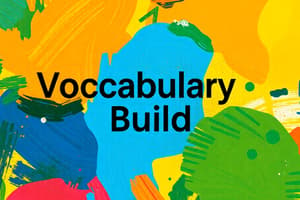Podcast
Questions and Answers
Which of the following best explains the advantage of contextual learning over rote memorization for vocabulary acquisition?
Which of the following best explains the advantage of contextual learning over rote memorization for vocabulary acquisition?
- It allows for quicker memorization of a larger number of words in a shorter time.
- It reduces the need for constant review and reinforcement due to immediate retention.
- It eliminates the need for dictionaries or thesauruses, streamlining the learning process.
- It enables a deeper understanding of word nuances, usage, and application in varied situations. (correct)
How does analyzing sentence structure and surrounding words primarily aid in vocabulary acquisition through contextual learning?
How does analyzing sentence structure and surrounding words primarily aid in vocabulary acquisition through contextual learning?
- It enables learners to infer the meanings of unfamiliar words based on context. (correct)
- It teaches learners how to write complex sentences using new vocabulary.
- It allows learners to bypass the need for dictionary definitions.
- It simplifies the process of memorizing long lists of synonyms and antonyms.
In what way does paying attention to the tone and style of writing enhance vocabulary acquisition through contextual learning?
In what way does paying attention to the tone and style of writing enhance vocabulary acquisition through contextual learning?
- It helps learners identify grammatical errors in the text.
- It simplifies the process of understanding complex sentence structures.
- It enables learners to predict the plot of a story more accurately.
- It reveals subtle differences in word choice and connotation. (correct)
Why is creating original sentences using new words in varied contexts considered an effective strategy for vocabulary acquisition?
Why is creating original sentences using new words in varied contexts considered an effective strategy for vocabulary acquisition?
What is the primary cognitive benefit of discussing and explaining contextual meanings with others in vocabulary learning?
What is the primary cognitive benefit of discussing and explaining contextual meanings with others in vocabulary learning?
How can recognizing collocations and common phrases associated with new words improve language skills?
How can recognizing collocations and common phrases associated with new words improve language skills?
In what way does recognizing how context influences a word's emotional weight or implication enhance expressive capabilities?
In what way does recognizing how context influences a word's emotional weight or implication enhance expressive capabilities?
How do mnemonic devices enhance vocabulary retention compared to rote memorization?
How do mnemonic devices enhance vocabulary retention compared to rote memorization?
How does the use of visual imagery in mnemonic devices support vocabulary acquisition?
How does the use of visual imagery in mnemonic devices support vocabulary acquisition?
In what way does storytelling aid in vocabulary acquisition when used as a mnemonic device?
In what way does storytelling aid in vocabulary acquisition when used as a mnemonic device?
What is the primary function of keyword mnemonics in vocabulary retention?
What is the primary function of keyword mnemonics in vocabulary retention?
How does the memory palace technique (method of loci) specifically aid in vocabulary acquisition?
How does the memory palace technique (method of loci) specifically aid in vocabulary acquisition?
Why is regular review and reinforcement of mnemonic associations essential for long-term vocabulary retention?
Why is regular review and reinforcement of mnemonic associations essential for long-term vocabulary retention?
How does spaced repetition optimize memory consolidation for vocabulary learning?
How does spaced repetition optimize memory consolidation for vocabulary learning?
What is the role of algorithms in software and apps that utilize spaced repetition?
What is the role of algorithms in software and apps that utilize spaced repetition?
Why are regular review sessions, even if brief, crucial for reinforcing memory in spaced repetition?
Why are regular review sessions, even if brief, crucial for reinforcing memory in spaced repetition?
How does active recall during spaced repetition sessions specifically enhance long-term memory?
How does active recall during spaced repetition sessions specifically enhance long-term memory?
What is the primary benefit of consistent adherence to a spaced repetition schedule?
What is the primary benefit of consistent adherence to a spaced repetition schedule?
In what way does monitoring progress and adjusting review intervals as needed improve learning outcomes in spaced repetition?
In what way does monitoring progress and adjusting review intervals as needed improve learning outcomes in spaced repetition?
How do language learning apps contribute to advanced vocabulary acquisition?
How do language learning apps contribute to advanced vocabulary acquisition?
What is the primary advantage of using online dictionaries and thesauruses for vocabulary learning?
What is the primary advantage of using online dictionaries and thesauruses for vocabulary learning?
In what way do digital flashcard programs facilitate spaced repetition in vocabulary learning?
In what way do digital flashcard programs facilitate spaced repetition in vocabulary learning?
How do podcasts and audiobooks contribute to vocabulary learning?
How do podcasts and audiobooks contribute to vocabulary learning?
What is the primary benefit of using online forums and language exchange platforms for vocabulary learning?
What is the primary benefit of using online forums and language exchange platforms for vocabulary learning?
How do browser extensions aid in vocabulary acquisition while browsing the web?
How do browser extensions aid in vocabulary acquisition while browsing the web?
In what way can speech recognition software improve vocabulary learning?
In what way can speech recognition software improve vocabulary learning?
How do text-to-speech tools assist in vocabulary learning?
How do text-to-speech tools assist in vocabulary learning?
What is the benefit of using online corpora for vocabulary learning?
What is the benefit of using online corpora for vocabulary learning?
How do video platforms with subtitles contribute to vocabulary acquisition?
How do video platforms with subtitles contribute to vocabulary acquisition?
How does active recall enhance long-term retention compared to passive review?
How does active recall enhance long-term retention compared to passive review?
How does self-testing promote active recall in vocabulary learning?
How does self-testing promote active recall in vocabulary learning?
In what way does writing summaries of learned material promote active recall?
In what way does writing summaries of learned material promote active recall?
How does teaching new words to others reinforce understanding and promote active recall?
How does teaching new words to others reinforce understanding and promote active recall?
In what way does engaging in conversations and using new words in spontaneous speech necessitate active retrieval from memory?
In what way does engaging in conversations and using new words in spontaneous speech necessitate active retrieval from memory?
How do fill-in-the-blank exercises promote active recall in vocabulary learning?
How do fill-in-the-blank exercises promote active recall in vocabulary learning?
How does brainstorming lists of related words or concepts activate memory networks?
How does brainstorming lists of related words or concepts activate memory networks?
Why is it important to challenge oneself with increasingly difficult vocabulary exercises?
Why is it important to challenge oneself with increasingly difficult vocabulary exercises?
How can integrating active recall into daily learning routines maximize its benefits?
How can integrating active recall into daily learning routines maximize its benefits?
How does the application of spaced repetition, combined with mnemonic devices, influence long-term retention compared to using either method in isolation?
How does the application of spaced repetition, combined with mnemonic devices, influence long-term retention compared to using either method in isolation?
In what way does utilizing speech recognition and text-to-speech software in tandem contribute to a more profound understanding of vocabulary nuances compared to using them separately?
In what way does utilizing speech recognition and text-to-speech software in tandem contribute to a more profound understanding of vocabulary nuances compared to using them separately?
How does engaging with online corpora to analyze word frequencies and contextual usage impact learners' ability to infer meaning compared to relying solely on dictionary definitions?
How does engaging with online corpora to analyze word frequencies and contextual usage impact learners' ability to infer meaning compared to relying solely on dictionary definitions?
How does incorporating active recall techniques, such as teaching new words to others, influence long-term retention when compared to passive methods like repeatedly reading definitions?
How does incorporating active recall techniques, such as teaching new words to others, influence long-term retention when compared to passive methods like repeatedly reading definitions?
How does immersion in a language-rich environment, combined with structured vocabulary learning techniques, affect overall language proficiency compared to only focusing on structured learning?
How does immersion in a language-rich environment, combined with structured vocabulary learning techniques, affect overall language proficiency compared to only focusing on structured learning?
Flashcards
Contextual Learning
Contextual Learning
Understanding words in sentences and real-life situations, noting nuances in meaning and usage.
Mnemonic Devices
Mnemonic Devices
Memory aids using associations, visualizations, or patterns to recall information.
Spaced Repetition
Spaced Repetition
Reviewing information at increasing intervals, optimizing memory consolidation.
Active Recall
Active Recall
Signup and view all the flashcards
Acronyms
Acronyms
Signup and view all the flashcards
Rhymes and Songs
Rhymes and Songs
Signup and view all the flashcards
Visual Imagery
Visual Imagery
Signup and view all the flashcards
Storytelling
Storytelling
Signup and view all the flashcards
Keyword Mnemonics
Keyword Mnemonics
Signup and view all the flashcards
Peg Systems
Peg Systems
Signup and view all the flashcards
Memory Palaces
Memory Palaces
Signup and view all the flashcards
Association Techniques
Association Techniques
Signup and view all the flashcards
Spaced Repetition Software
Spaced Repetition Software
Signup and view all the flashcards
Language Learning Apps
Language Learning Apps
Signup and view all the flashcards
Online Dictionaries
Online Dictionaries
Signup and view all the flashcards
Digital Flashcards
Digital Flashcards
Signup and view all the flashcards
Podcasts and Audiobooks
Podcasts and Audiobooks
Signup and view all the flashcards
Language Exchange Platforms
Language Exchange Platforms
Signup and view all the flashcards
Self-Testing
Self-Testing
Signup and view all the flashcards
Flashcard Recall
Flashcard Recall
Signup and view all the flashcards
Writing Summaries
Writing Summaries
Signup and view all the flashcards
Teaching Others
Teaching Others
Signup and view all the flashcards
Conversational Usage
Conversational Usage
Signup and view all the flashcards
Fill-in-the-Blank
Fill-in-the-Blank
Signup and view all the flashcards
Brainstorming Lists
Brainstorming Lists
Signup and view all the flashcards
Vocabulary Exercises
Vocabulary Exercises
Signup and view all the flashcards
Study Notes
- Advanced vocabulary learning involves strategies beyond rote memorization, emphasizing deeper understanding, contextual usage, and active recall.
- Effective techniques utilize methods designed to enhance retention, comprehension, and application of new words.
- Immersion in language-rich environments facilitates natural vocabulary acquisition through repeated exposure.
- Strategies include contextual learning, mnemonic devices, spaced repetition, and utilizing technology.
Contextual Learning
- Contextual learning emphasizes understanding words within the context of sentences, paragraphs, and real-life situations.
- Exploration of how words function in various contexts helps learners note nuances in meaning and usage, rather than memorizing isolated definitions.
- Wide reading across genres and mediums provides rich contextual exposure.
- Analysis of sentence structure and surrounding words aids in inferring the meanings of unfamiliar terms.
- Attention to tone and style reveals subtle differences in word choice and connotation.
- Use of a dictionary or thesaurus clarifies context-specific meanings and expands comprehension.
- Creating original sentences using new words in varied contexts reinforces understanding and retention.
- Discussion and explanation of contextual meanings with others deepens cognitive processing.
- Identification of collocations and common phrases improves fluency and natural language use.
- Recognition of how context influences a word's emotional weight or implication enhances expressive capabilities.
Mnemonic Devices
- Mnemonic devices are memory aids using associations, visualizations, or patterns to help recall information.
- Acronyms and initialisms create memorable abbreviations for complex terms or lists.
- Rhymes and songs link new words with catchy, familiar patterns, aiding memorization.
- Visual imagery pairs words with vivid mental pictures, leveraging the brain’s capacity for visual memory.
- Storytelling weaves words into engaging narratives, making them easier to remember within a sequence of events.
- Keyword mnemonics connect new words with similar-sounding or visually related keywords for easier recall.
- Peg systems assign numbers to specific words/images, associating them with new vocabulary for ordered memorization.
- Memory palaces (method of loci) create mental maps of familiar places, placing new words at specific locations to aid recall.
- Association techniques link new words with personal experiences, emotions, or existing knowledge for deeper connections.
- Flashcards with mnemonic cues on one side and definitions on the other facilitate active recall and spaced repetition.
- Regular review and reinforcement of mnemonic associations strengthens long-term retention.
Spaced Repetition
- Spaced repetition involves reviewing information at increasing intervals over time.
- This method optimizes memory consolidation by scheduling reviews just before information is likely to be forgotten.
- Software and apps use algorithms to determine optimal review times based on individual learning curves.
- Flashcard systems with spaced repetition algorithms present more challenging words more frequently and easier words less often.
- Regular review sessions, even if brief, are crucial for reinforcing memory and preventing decay.
- Initial reviews are typically more frequent, with intervals gradually increasing as retention improves.
- Active recall during spaced repetition sessions strengthens neural pathways and enhances long-term memory.
- Consistent adherence to a spaced repetition schedule maximizes learning efficiency and retention rates.
- Monitoring progress and adjusting review intervals as needed ensures optimal learning outcomes.
- This technique is versatile and applicable to subjects beyond vocabulary.
Utilizing Technology
- Technology offers various tools and resources for advanced vocabulary learning.
- Language learning apps provide interactive lessons, vocabulary exercises, and progress tracking.
- Online dictionaries and thesauruses offer definitions, synonyms, antonyms, and example sentences.
- Digital flashcard programs facilitate spaced repetition and customizable vocabulary lists.
- Podcasts and audiobooks expose learners to new words in spoken context, improving listening comprehension.
- Online forums and language exchange platforms connect learners with native speakers for real-time practice.
- Browser extensions provide instant definitions and translations while browsing the web.
- Speech recognition software helps improve pronunciation and speaking skills.
- Text-to-speech tools allow learners to hear correct pronunciations and usage of new words.
- Online corpora provide large collections of texts, enabling analysis of word frequencies and contextual usage.
- Video platforms offer diverse content with subtitles, allowing simultaneous reading and hearing of new words.
Active Recall
- Active recall involves retrieving information from memory without prompting.
- This method strengthens memory traces and enhances long-term retention.
- Self-testing is a powerful way to practice active recall by answering questions or completing exercises without looking at the answers.
- Flashcards encourage active recall by requiring learners to generate definitions or usage examples from memory.
- Writing summaries of learned material forces learners to actively process and synthesize information.
- Teaching new words to others reinforces understanding and promotes active recall through explanation.
- Engaging in conversations and using new words in spontaneous speech necessitates active retrieval from memory.
- Completing fill-in-the-blank exercises requires learners to recall specific words based on context.
- Brainstorming lists of related words or concepts activates memory networks and strengthens associations.
- Regularly challenging oneself with increasingly difficult vocabulary exercises promotes continuous growth and retention.
- Active recall should be integrated into daily learning routines to maximize its benefits for vocabulary acquisition.
Studying That Suits You
Use AI to generate personalized quizzes and flashcards to suit your learning preferences.




